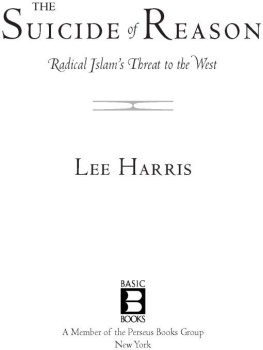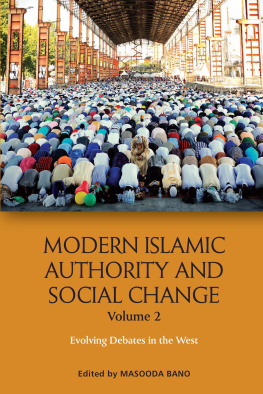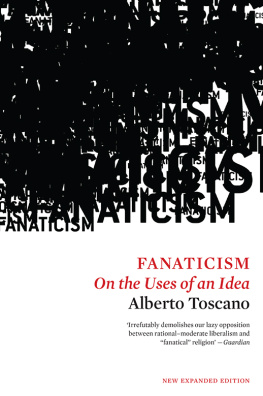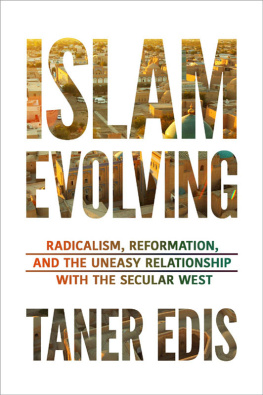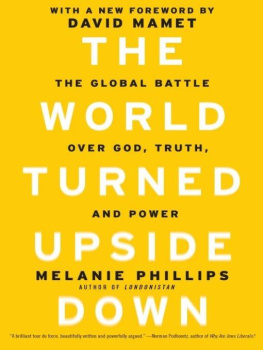Table of Contents
Praise for The Suicide of Reason
Harriss book is so engaging that it is difficult to put down, and its haunting assessments make it difficult for a reader to sleep at night. He deserves praise for raising serious questions.
The New York Times Book Review
In his sobering analysis, author and analyst Lee Harris sets centuries of democratic evolution on its head.History Wire
[Harris is] nearly alone in explaining coherently why we Western children of the Enlightenment, and especially his fellow American liberal individualists and exceptionalists, are peculiarly ill-equipped to defend against it. The Ottawa Citizen
Mr. Harriss arguments should give us pause. And his book demands close attention....Mr. Harris mounts a challenge, and even if we harbor less apocalyptic visions, that challenge is considerable. If we believe, as Mr. Harris affirms, that the societies that have arisen out of Enlightenment ideas, whatever their flaws, really are morally superior to others, if we are convinced that the values of the West are rare and crucial and fragile, then to what extent are we willing to make a stand on their behalf? New York Times
This is a thought-provoking and insightful book sure to challenge debate. Library Journal
Once again Lee Harris throws cold water on thinking Americans tendency to view Islamist terrorists as noble freedom fighters in the vein of black Americans during the Civil Rights movement or East Timorese throwing off the Indonesian yoke. Harris understands that we are faced with an enemy who seeks not reasoned negotiation but the destruction of the Western way of life, and that holding to self-critical, multi-culti pieties during this crisis will spell self-sabotage.John McWhorter, author of Winning the Race: Beyond the Crisis in Black America
For Andy Fuson
Our fond hope is that by some accord of conscious purpose among the states of the world the passion to expand and master can be eliminated from the politics of men. But when we grasp the living quality of human societies, we realize that this is a vain, and, indeed, a perilous hope. Because they are living entities, not conscious associations, these historical societies unavoidably struggle with one another. We know from the nature of living things that they are certain to do so. We can anticipate the type of situation that must always develop between two societies as it must develop between two competing species. The details of such historical struggles, being among the societies of men, will not resemble the struggles of species of wild animals but the essential patterns will be the same. Each society will seek to live its life regardless of the welfare of others. We know historically that some societies have destroyed others, as some species have destroyed other species. We know also of societies that have existed together. But we know equally that no society has ever long existed through the forbearance and charity of another. Each that has survived has survived by its own material power.
LAWRENCE R. BROWN, The Might of the West
Nothing is easier than to admit in words the truth of the universal struggle for life, or more difficultat least I have found it sothan constantly to bear this conclusion in mind.
CHARLES DARWIN
PREFACE
Not so long ago, many intelligent men and women in the West thought that the world was approaching the end of history. Though it might not be quite the golden age of the starry-eyed socialist utopians of the nineteenth century, it would definitely achieve something of enormous value: The end of history would mean the virtual abolition of the law of the jungle as it applied to human affairs. The global spread of capitalism would relieve the poverty of the Third Worldnot immediately, of course, but, if given a chance, over the not too distant future. Western-style liberal democracies would replace the corrupt regimes that impeded human progress in so many parts of the world. Of course, there were bound to be skirmishes and conflicts, but these could be dealt with through international bodies such as the United Nations, backed, needless to say, by the awesome military might of the United States. After all, this multilateral approach had worked during both the Gulf War and the Balkan War. Certainly the same technique could be applied to any other situations in which the law of the jungle threatened to disrupt the rule of law that had come to govern the conduct of all civilized and reasonable people.
Yet today, brute force and atrocious violence increasingly shape the course of events. In spring of 2005, Time magazine displayed a cover captioned People Power that showed a jubilant scene of the Lebanese people celebrating what was called the Cedar Revolution. In mid-July of 2006, the cover of Time showed the bombed wreckage of Beirut. Meanwhile, in Iraq, once the promised land of Middle Eastern democratic reform, death squads murder in cold blood Iraqi boys who dare to wear shorts, and Iraqi barbers who sin against Islam by shaving off beards, while American soldiers are accused by their own government of brutalizing and killing innocent Iraqi women and children.
What went wrong? How could so many intelligent men and women have been so terribly mistaken about the future? Those who hailed the Cedar Revolution in Lebanon were no doubt completely sincere in their conviction that the withdrawal of Syrian troops would lead to the triumph of democracy in Lebanon. The American neoconservative intellectuals who planned the reconstruction of Iraq were just as sincere in their faith that Iraq would become a model of democracy, and they were equally convinced that other Muslim nations would be eager to imitate it. Yet all these intelligent men and women were not merely wrong, they were disastrously, mind-bogglingly wrong.
When the confident expectations of our leaders and opinion makers turn out to be so dreadfully off the mark, this is a signal that either they have drifted away from reality, or reality has drifted away from them. It is also a warning sign that those who are shaping our destiny may be the victims of their own wishful thinking and ideological enthusiasms, in which case we have just cause for alarm. Despite what our leaders tell us, we are not getting close to the end of history. We are not even confronting a mere clash of civilizations. Instead, we are facing something none of our leaders wishes to think aboutthe crash of civilization as we know it. The leadership of the West refuses to think the worst. But refusal to think the worst is the best way to permit the worst to come about. The historian Allan Nevins argued that one of the causes of the American Civil War was the general failure to imagine just how horrible such a war would be, and the same principle holds for many other historical catastrophes.
Therefore, it is urgently necessary for someone to think the very worst. That is why I have written this book.
Paradoxically, the source of our troubles is that we have been blessed to live during one of those rare and exceptional eras in which the law of the jungle appeared to have been repealed. In the modern liberal West, for the first time in history, something new came into the world: popular cultures of reason, and all of us in the modern liberal West are its beneficiaries. Before the Enlightenment, reason had been the preserve of privileged elites; but with the advent of universal secular education, undertaken by the state, the goal was to create whole populations that refrained from solving their conflicts through an appeal to violence and brute force. Instead, conflicts were handled through reasonable proceduresdiscussion, debate, arbitration, parliamentary routines, courts of law, international bodies. Vigilante justice was no longer accepted; mobs no longer rioted to get their way; there was no need for the vendetta and the blood feud. Or, when these things happened, they happened outside the pale of respectability. Instead, men and women went about their daily lives behaving quite reasonably with one another, and came to expect others to behave reasonably with them.

